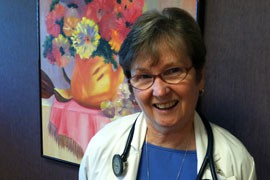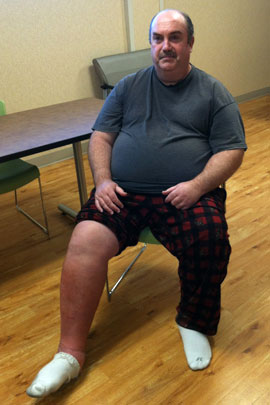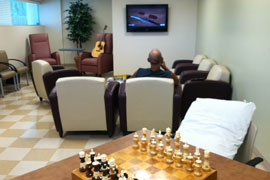Cronkite News has moved to a new home at cronkitenews.azpbs.org. Use this site to search archives from 2011 to May 2015. You can search the new site for current stories.
New facility offers transitional care to Phoenix homeless
PHOENIX – Homeless and addicted to methamphetamine, Kevin Martin said he’d given up on himself when he went into the hospital with pneumonia back in September.
“I was down to 130 pounds, lost my appetite, couldn’t walk, couldn’t lift my right arm,” Martin said. “I thought if I have to live like this, this is no life.”
Then Adele O’Sullivan, a nun who serves the homeless community as a doctor, stopped by his bed and told him about a new facility called Circle the City, where he would be the first patient.
“At that moment, I had an epiphany – or that aha moment, I call them – that there was hope,” Martin said.
At Circle the City, up to 50 patients have beds in a dorm-like setting that’s clean and well-lit. Three meals are served each day, nurses are available from 7 a.m. to 7 p.m. and a den offers recliners, television and games. Hot showers and hair cuts help the healing process.
O’Sullivan said Circle the City, the state’s first respite care facility for homeless patients, addresses an unmet need.
“The gap is that homeless people who are too sick to be in our streets and shelters and yet not sick enough to be in the hospital had nowhere to go where they could have their basic needs met,” she said. “When we get out of the hospital, we go home, and we have families that will watch us if we need something.”
O’Sullivan is now the president and medical director of the nonprofit medical center, which opened in October. It’s funded through hospital referrals, grants and donations.
“It’s a dream come true,” she said. “Every day we say, ‘This is better than we could’ve imagined.’ And it’s doing just what we had imagined it would do.”
Steve Beeman, who was treated at a hospital for cellulitis, said he was still in bad shape when he was discharged. Even after a week at Circle the City, his right leg remained swollen and red.
“This is a godsend,” Beeman said. “I can’t imagine not having a place like this.”
Circle the City has the potential to not only help people but to lower health care costs, according to Brandon Clark, its chief administrative officer.
“The sheer expense of an acute inpatient care is benchmarked anywhere from $1,000 to $1,500 a day,” he said. “The care we’re providing here is at a fraction of that cost.”
O’Sullivan said Circle the City helps hospitals save money by keeping homeless patients from using an ER like a primary-care clinic.
“You have a fresh surgical wound, you go home to a clean bed, to bathroom facilities, to clean dressings,” O’Sullivan said. “And if you don’t have any of those things, what are the chances that your wound is going to get infected? That you’re going to land back with a complication?”
To help homeless patients get a fresh start, caseworkers spend time with them while they’re staying at Circle the City.
“So if it’s this person needs to be connected with the mental health system, we have the opportunity to pull those resources in,” O’Sullivan said. “If the problem is substance abuse, and we have the opportunity to give this person a chance to connect with services that can be the opportunity for a whole new life.”
Beeman called the respite center a blessing.
“There was a caseworker here who’s going to help me find work, hopefully. Because I’ve been out of work for a while,” he said. “I’m hoping that I’ll heal well and that I won’t have to go back to a hospital anytime soon and that I can get back on my feet again.”
As Thanksgiving approaches, Kevin Martin will mark 60 days clean from drugs. He’s grateful to be alive and thankful for Circle the City.
“This place saved my life, simple as that.”









